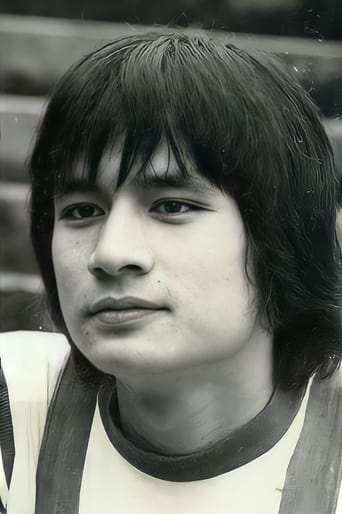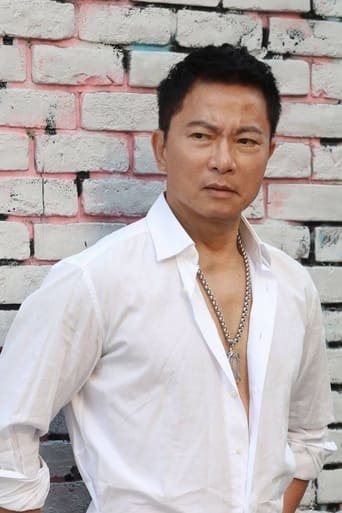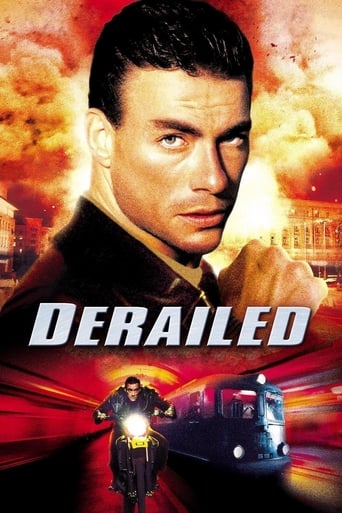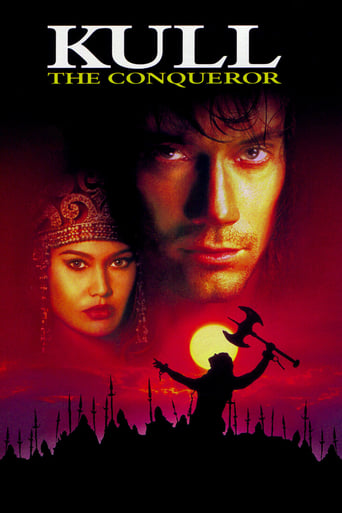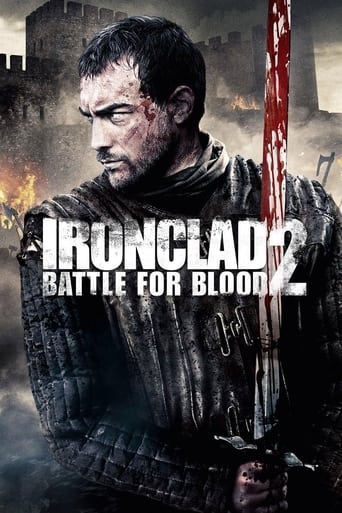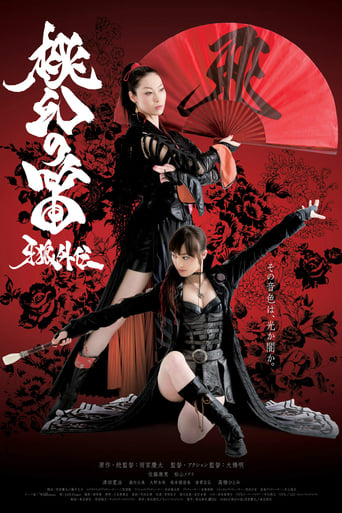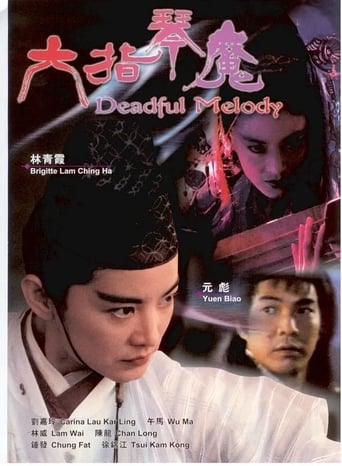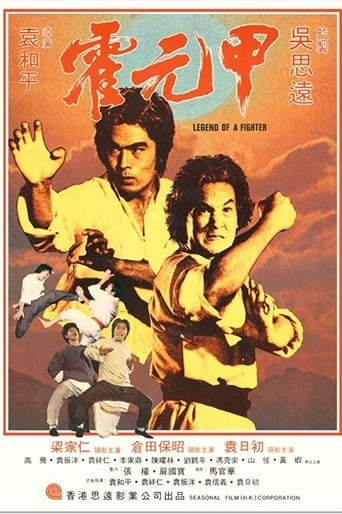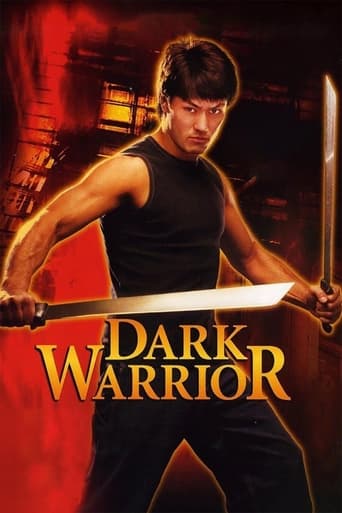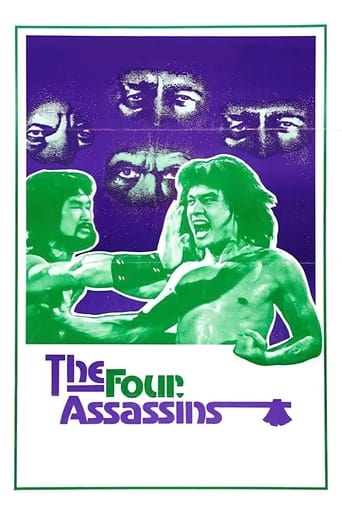
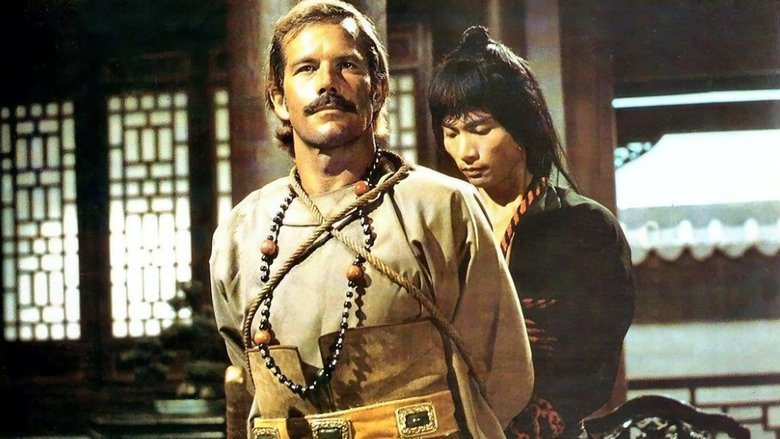
The Four Assassins (1975)
Set at the time of Italian explorer Marco Polo's historic expedition to China ,during the reign of Monogol ruler Kublai Khan, it stars American actor Richard Harrison as Polo. Taking considerable liberties with the historic record, the film has Polo turning up as an Imperial Inspector assigned to root out Chinese rebles in the south, but eventually being won over to their cause.
Watch Trailer
Cast


Similar titles
Reviews
I do like watching these early 1970's Shaw Brothers Productions. It gives me a chance to see my faves plus some recognizable faces in strong roles. I don't understand why Marco Polo gets top billing. He's just an observer throughout the film. The movie begins with Monguls showing off for Kubla Khan. Abulahua (Gordon Liu Chia-Hui) shows incredible skill with blades. Caldalu (Leung Kar-Yan) has the Iron Palm down pat. It has another name in the movie. Then there's Dulldan (Johnny Wang Lung-Wei) who is quite skilled at hand to hand. They become Khan's top 3 security guards. I did not like Marco Polo (Richard Harrison) at the beginning of the film. He came across as yet another European sucking up to the man in power. I loathe sycophants.Zu Jianmin (Carter Wong Ka-Tat) and companion make an attempt on Khan's life. It doesn't end well. Good fight scene though. Marco Polo is merely an observer during all the action. He is an observer for most of the movie. When Zu Jianmin manages to escape Khan's palace, he is followed by Khan's top three and Polo. They corner Zu, Mrs. Zu (Shih Szu) and Zu's younger brother, (Ting Wa-Chung) at his home. Zu and Ting are killed and his wife becomes a captive, after Polo stops her from attempting to kill herself.Polo and his cohorts are traveling along a road with Mrs. Zu bound and being dragged along by a guard, when they encounter Zu'z blood brothers, Li Xiongfeng (Alexander Fu Sheng), Zhou Xingzheng (Chi Kuan-Chun), Huang Zonghan (Bruce Tong Yim-Chaan) and Chen Jie (Phillip Kwok Chun-Fung), who are all pushing carts loaded with salt bags. Dulldan harasses Li, who after a stern look fro Zhou, feigns not knowing Kung Fu to protect himself. The four are ordered to carry Mrs. Zu on one of the wagons.There is a scene at the inn where Polo, his entourage and the 4 heroes stay that involves Li peeing the soup prepared for Polo et al. The Inn waiter (Lam Fai-Wong) snickers and serves the soup. Li and his companions plot to rescue Mrs. Zu. Things don't go well and they have to make an escape. Polo uses Mrs. Zu as a decoy to find out where the heroes are staying and learn of their plans regarding another attempt on Khan's life. Side note - Polo's attire has a zipper which wasn't invented until the 1890's. Also, he keeps shaking hands with people. He's supposed to have been in China for years and rather than follow their means of address, he uses an unknown custom? Hmm, no. He would do as they do. The four heroes follow Mrs. Zu to her home, where her father, Chief Wang (Lo Dik) indirectly teaches them Kung Fu. You cannot teach civilians Kung Fu, nor are you allowed to have anything that can be used as a weapon per the Ruling Dynasty edicts. So, you improvise. Li learns Iron Palm by strengthening his hands and arms through milling beans. Zhou learns the same style Zu knew, which I know as Iron Skin from other Shaw movies. Huang learns to hone his already present strength with a strong Qi by pulverizing rocks. Chen improves his acrobatics by, uhm, jumping in and out of deep manure puddles.Polo decides he wants to check out Chief Wang's house for the 4 men and Mrs. Zu. He sees nothing out of the ordinary, mainly because Chief Wang ensured he wouldn't. Polo sees Chen, from the back. he also sees Li in the mill, but doesn't recognize him. Polo plots to return at night to see what's really going on. Wang does his best to keep up appearances in expectation of a return visit.Polo receives an edict to eliminate the 4 heroes and everyone at Wang's estate. He devices a plan with Dulldan, Caldalu and Abulahua to take out the heroes. Polo sees Huang crushing rocks with his bare hands with ease and Chen somersaulting all over the puddles. He sees Li splitting firewood with his bare hands. He encounters Mrs. ZU moments after her suicide. Polo is lectured on customs and the way of the world by Wang. Polo is asked if he would stand by as another country swooped in to take over Italy or would he fight. Polo admits he would fight. Wang informs that is all the Chinese are doing. Fighting for what is theirs.Polo decides to help the heroes by giving them information on Khan's top 3 fighters. He informs the heroes who should battle each of the three. Polo is then bound and lead away from the estate. A rouse to bring Abulahua into the open for Zhou to fight. The fight scene between Chen and Dulldan is more acrobatics than fighting. Chen finally gains the upper hand and kills Dulldan. He then goes to find Li who is fighting Caldalu. It's Palm style vs Palm style. I love watching Fu Sheng fight scenes. There's a bit of humor in everything he does. He too prevails against his opponent.I felt sorry for Huang. he was left to keep everyone else at bay. Sure, he has the strength of Sampson, but come on. He held out quite well for a while. He does a lot of property damage trying to keep the mongols out of the estate. When the dust settles and he is of course dying from his wounds (I've only seen two movies where one of Bruce's characters survives), he jokingly tells Li and Chen that one man against all those Tartans was fun.The fight between Zhou and Abulahua was impressive. The only flaw was Zhou had his sash tied to cover the one spot of his body he couldn't protect with Iron Skin. It was a target for the spears and arrows after he finished with Abulahua. Once more, Polo merely stands there, watching the action. He actually has the gall to walk up to a dying Zhou and shake his hand. Zhou wipes the blood off before shaking Polo's hand. Really? You could have helped Zhou, but you just shake his hand and walk away?The movie ends with Li and Chen walking off with Wang and his staff while Polo watches them. I gave it an 8 for the Hans who id battle against Polo and his henchmen. Personally, there was no need for Polo to even be in this film. His role was pointless.
During the Mongol reign of China in the 13th century, six sworn brothers of the oppressed Ming loyalists plan a rebellion against the tyranny. When two of them are brutally killed in their daring attempt to assassinate the Mongol emperor Kublai Khan, the remaining four fighters band together to take revenge. But they do not have the upper hand since the Emperor is surrounded by three of his best fighters: Daidalu (played by Liang Chia-jen or popularly known as "Beardy"), who possesses the Fiery Palm technique that instantly kills any opponent who sustains his swift blow, a double-sword wielding fighter who kills by dismembering his opponent's armpits named Abulabha (Gordon Liu) and the arm-locking and waist-breaking wrestler Duilitan (Johnny Wang Lung Wei). Before the four rebels can execute their plan to defeat their much-skilled rivals, they decide to undergo arduous training in special kungfu techniques: Fu Sheng with the Iron Palm technique - which makes him able to release fatal blows through his inner strength, Kuo Chui with the Leaping Kick technique - which makes him able to somersault in the air and land mortal kicks, Yen-tsan Tang with the Super Strength technique - which makes him able to release extraordinary strength to defeat his opponents, and Chi Kuan-chin with the Bamboo Twisting technique - which makes him invulnerable to sword attacks and arrow shots but for one weak spot. Since the Mongols have banned all sorts of kungfu training throughout the country, the four rebels have no other option but to practice secretively under their teacher's guidance only in the small hours for months. Marco Polo, who has been assigned as a viceroy by the Mongol emperor with a priority to thwart these Chinese rebels, eventually sides with the rebellion. When the three Mongol fighters and their troops, with Polo's lead, have located and surrounded the rebels' hideout, they realize that they are facing a fearful four-man army who is prepared for anything that comes their way. The inevitable one-on-one blood-for-blood duel ensues, culminating in a life-and-death showdown that would decide the fate of the four heroes and their force of rebellion.This is not a biopic of the famous Italian explorer. This is a 1975 Shaw Brothers mega-production that incorporates few facts but a lot of fiction into an exciting kungfu extravaganza, which was meant to attract wider international audience by casting American actor Richard Harrison as the title character. Those expecting to see a film on Marco Polo that is historically accurate will be sorely disappointed. The title itself, in my opinion, is rather misleading as the film does not portray the life of Marco Polo himself. A more appropriate title should be: THE FOUR ASSASSINS, which is actually the alternate title, MARCO POLO AND THE FOUR ASSASSINS, or MARCO POLO AND THE FOUR REBELS.Despite that, if you are familiar with a Shaw Brothers film, you will see exciting kungfu training and fighting of the four characters. Unlike the weak fight sequences in HEROES TWO (1974), those seen here are surprisingly well-choreographed, which elevate the tension during the climactic fights.All in all, THE FOUR ASSASSINS comes recommended for those who enjoy watching solid kungfu flicks of the 70's - Shaw Brothers style!
MARCO POLO gets off to a good start (as one might well expect, this being a Chang Cheh epic), with several martial arts bouts conducted for the amusement of the Italian explorer. Among the fighters is Gordon Liu, wielding a pair of swords. What's unusual about this is that Liu is playing one of the bad guys. The festivities are interrupted by a pair of "assassins" who include Carter Wong. The interruption proves short-lived, as Harrison as Polo leads the government goons after Wong and family. Wong and his young brother are killed. Enter our heroes, led by Alexander Fu Sheng and a baby-faced Kuo Chui (who's "introduced" in this film). Our four heroes (referred to throughout as "assassins") are sent off to train separately (Kuo Chui, as the new kid, gets the short end of the stick: he trains in a pit of feces). (For some reason, some of the fighters are referred to as "pugilists," although none of them practice traditional pugilism.) The direction is top-notch and the action brilliant throughout. Another ten.
THE FOUR ASSASSINS (aka MARCO POLO, 1975) is that rare Hong Kong kung fu film which features a westerner in a pivotal, heroic role. Set at the time of Italian explorer Marco Polo's historic expedition to China, during the reign of Mongol ruler Kublai Khan, it stars American actor Richard Harrison as Polo. Taking considerable liberties with the historic record, the film has Polo turning up as an Imperial Inspector assigned to root out Chinese rebels in the south, but eventually being won over to their cause. As such, it relies on the formula commonly used in kung fu films to depict a much later period of conflict, that of Qing-era Manchu conquerors vs. Ming loyalists.The film boasts a large cast of formidable kung fu players, including, as three of the four heroes of the title, Alexander Fu Sheng, Chi Kuan-Chun, and, in his first film role, Kuo Chui (Philip Kwok, better known as one of the Five Venoms). The villains are portrayed by Wang Lung-Wei, Leung Kar Yan and the normally heroic Gordon Liu. These six actor-fighters are among the top names of 1970s Hong Kong kung fu cinema and any film with such a top-ranked cast involved in such a dazzling array of matches belongs at the top of any kung fu fan's must-see list. Also on hand are Billy Tang as the fourth assassin of the title and Carter Wong as an ill-fated would-be assassin.The film's one serious structural flaw is that it introduces the villains first and follows them around as they are assigned to accompany Polo on his travels and tour of inspection. The four heroes make comparatively little impact because we don't meet them until nearly half-way into the film and then have to wait during their period of training (at mundane tasks designed to mask their outlawed kung fu practice) before the spectacular final series of matches with the villains. Action director Lau Kar Leung ended his association with director Chang Cheh during the shooting of FOUR ASSASSINS (in Taiwan) and thereafter struck out on his own as a director.Marco Polo is played by American actor Richard Harrison, who starred in many Italian films in the 1960s, including spaghetti westerns and sword 'n' sandal adventures (GUNFIGHT AT RED SANDS, GLADIATORS SEVEN). He doesn't participate in any of the fighting here but simply gets to hang around the margins of the action and, ultimately, give advice to the heroes on how best to beat their opponents. Harrison appeared the following year in another historical kung fu film, BOXER REBELLION (1976, aka BLOODY AVENGERS), as a German officer in Peking who is confronted by three of this film's stars. I've also reviewed that film on IMDb and I recommend it highly.ADDENDUM (6/14/11): In October 2005, I acquired the Celestial Pictures Region 3 DVD of this film, under its original title, MARCO POLO, which is both letter-boxed and in Mandarin with English subtitles, two things I couldn't say about the TV broadcast I originally watched for this review. Well, I've finally watched the DVD. The "one serious structural flaw" I cited above (almost ten years ago!) didn't bother me this time. The late introduction of the heroes seemed to make sense now. Also, I feel terribly remiss for not having cited in my review the female lead, Shih Szu. I may not have been very familiar with her when I first watched this. I've since watched her in many films and reviewed several of them here (e.g. LADY HERMIT, THE RESCUE). She was quite an active action heroine in the early '70s. She doesn't have any fight scenes in this film, though, but she gives quite a stirring performance as the widow of a slain rebel and has some touching scenes with Harrison. I'm also impressed with the sympathetic way that Harrison's character, Marco Polo, is handled, He's actually working for the bad guys, the "Tartars," throughout, yet in spite of that, he shows respect for the rebels and they return it. Harrison's dialogue is dubbed in Mandarin.


